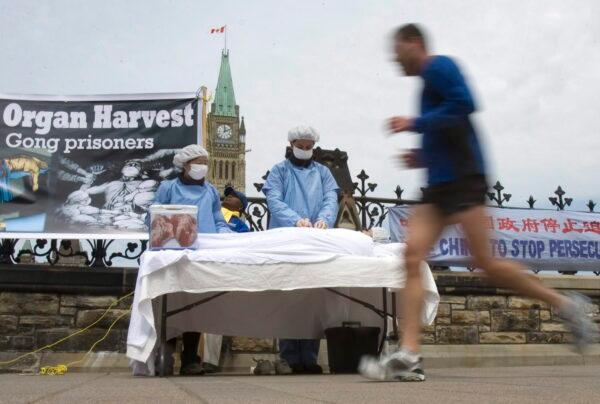According to the organizers of the Feb. 24 event, which was co-hosted by the International Coalition to End Transplant Abuse and the Victims of Communism Memorial Foundation, for the last two decades the CCP has been “systematically executing people on demand” to provide organs for transplantation.
“For the victims, which include political prisoners, Falun Gong practitioners, and Uyghurs, it is not just the harvesting of their organs, it is also a harvesting of their life,” the organizers said in announcing the conference.
“For the rest of us, it robs us of our humanity and forever poisons our capacity of being human.”
The conference brought together officials and dignitaries from over 25 countries, 117 organizations, and 12 universities worldwide. The keynote speaker was Sir Geoffrey Nice QC, who led the prosecution of former Serbian president Slobodan Milošević at the UN and more recently chaired the China Tribunal, a people’s tribunal looking into forced organ harvesting.
Among the guest speakers were Canadian human rights lawyer David Matas; Sean Lin, the communications director for the Falun Dafa Association in Washington, D.C.; and Wendy Rogers, a professor of Clinical Ethics at Macquarie University in Sydney, Australia.
Calls for International Actions Against CCP
The CCP’s organ harvesting crimes were first exposed by Matas and former cabinet minister David Kilgour in the early 2000s, when they investigated allegations of forced harvesting of organs from Falun Gong prisoners of conscience in China. Falun Gong, or Falun Dafa, is a traditional meditation practice based on the tenets of truthfulness, compassion, and tolerance, and its adherents have been subjected to a persecution campaign by the CCP since 1999.Lin, a survivor of 1989 Tiananmen Square massacre, told the panel that it is time for the international community to take direct action against the Beijing regime.
“If you do not deal with the Chinese Communist Party directly, the [practice] of forced organ harvesting in China won’t stop,” said Lin.

Matas said countries around the world should enact laws to prohibit their citizens from going to China for transplants, since the CCP runs the Chinese legal system and its own laws cannot be expected to prosecute forced organ harvesting crimes.
“Right now, for many countries, if a person kills someone in their own country for their organs, the person will have committed a crime. But if the person goes to China for organs harvested from a prisoner of conscience, the person has committed no crime in their own country, and whatever crime they may have committed in China will not be prosecuted,” he said.
Matas also suggested using Magnitsky legislation, with which a country can publicly name a person for being complicit in human rights violations, ban the individual from entry, and freeze their assets in that country. Several countries have their own version of a Magnitsky law, including Canada and the United States.
“It has not been used for those identified as complicit in forced organ harvesting in China,“ Matas said. ”Authorities of various countries which have this legislation have been asked to add perpetrators of forced organ harvesting in China to their Magnitsky Act list.”
Kilgour urged the conference participants to push their governments to boycott the 2022 Beijing Winter Olympics as well as businesses that could be using products made by forced labour from China’s Xinjiang region.
“Any deal with China on any matter must include an insistence that this barbaric practice stop immediately, coupled with a mechanism whereby such stoppage is verifiable,” Kilgour said.
“Responsible governments and businesses worldwide, including Canada and, I hope, all of your countries, to join the U.S. and Australia in boycotting anyone doing business in Xinjiang, for slavery in its internment camps is poisoning the supply chains of numerous well-known companies from democratic nations,” he said.
Actions in Canada
On Feb. 22, 2021, Canadian MPs voted unanimously in favour of a Conservative motion declaring Beijing’s oppression of Uyghurs and other Turkic Muslims an act of genocide.Sen. Marilou McPhedran said at the conference that Canada has introduced a bill in the Senate that would amend the Criminal Code and the Immigration and Refugee Protection Act in relation to trafficking in human organs.
“The new offence created in the Immigration and Refugee Protection Act would be to make it very clear that any evidence of trafficking in human organs or humans would be an automatic refusal for any entry to Canada,” McPhedran said.
MP Sameer Zuberi said he had heard from a Uyghur survivor of Xinjiang’s concentration camps about how he was subjected to a physical exam.
“This Uyghur individual, this individual who had committed no crime, was apprehended without any charge, didn’t know why he was there, but this was the exam that he was subject to. He thought that he would be dissected there on the table,” Zuberi said.
He also noted that there have been media reports of students, who are of Uyghur or other minority origins, being called to the Chinese Embassy and consulates in Canada to give blood samples.
“Why? It’s a good question. But we know that blood samples, when they’re given ... pave the way to allow for organs to be harvested more easily,” he said.





